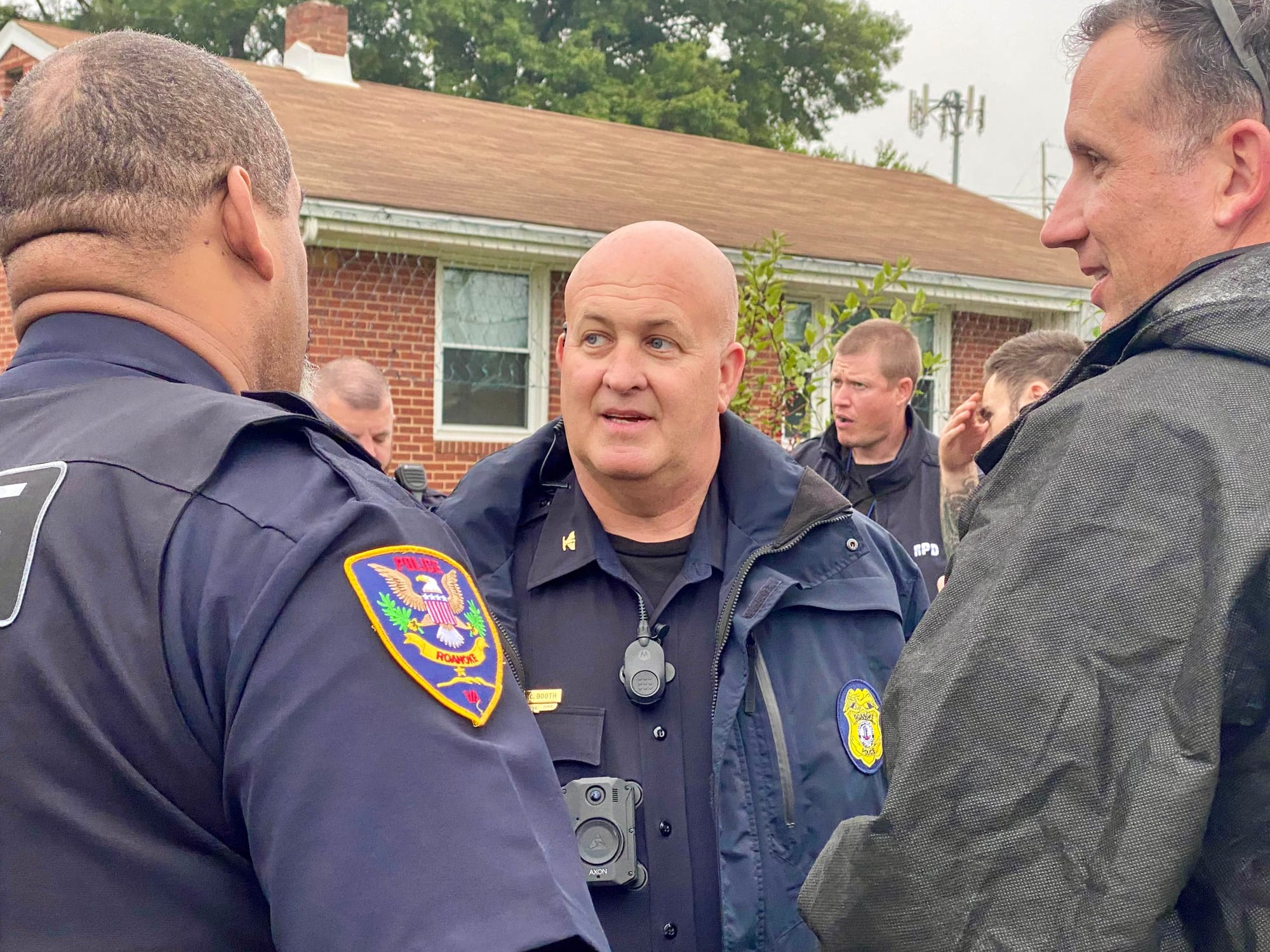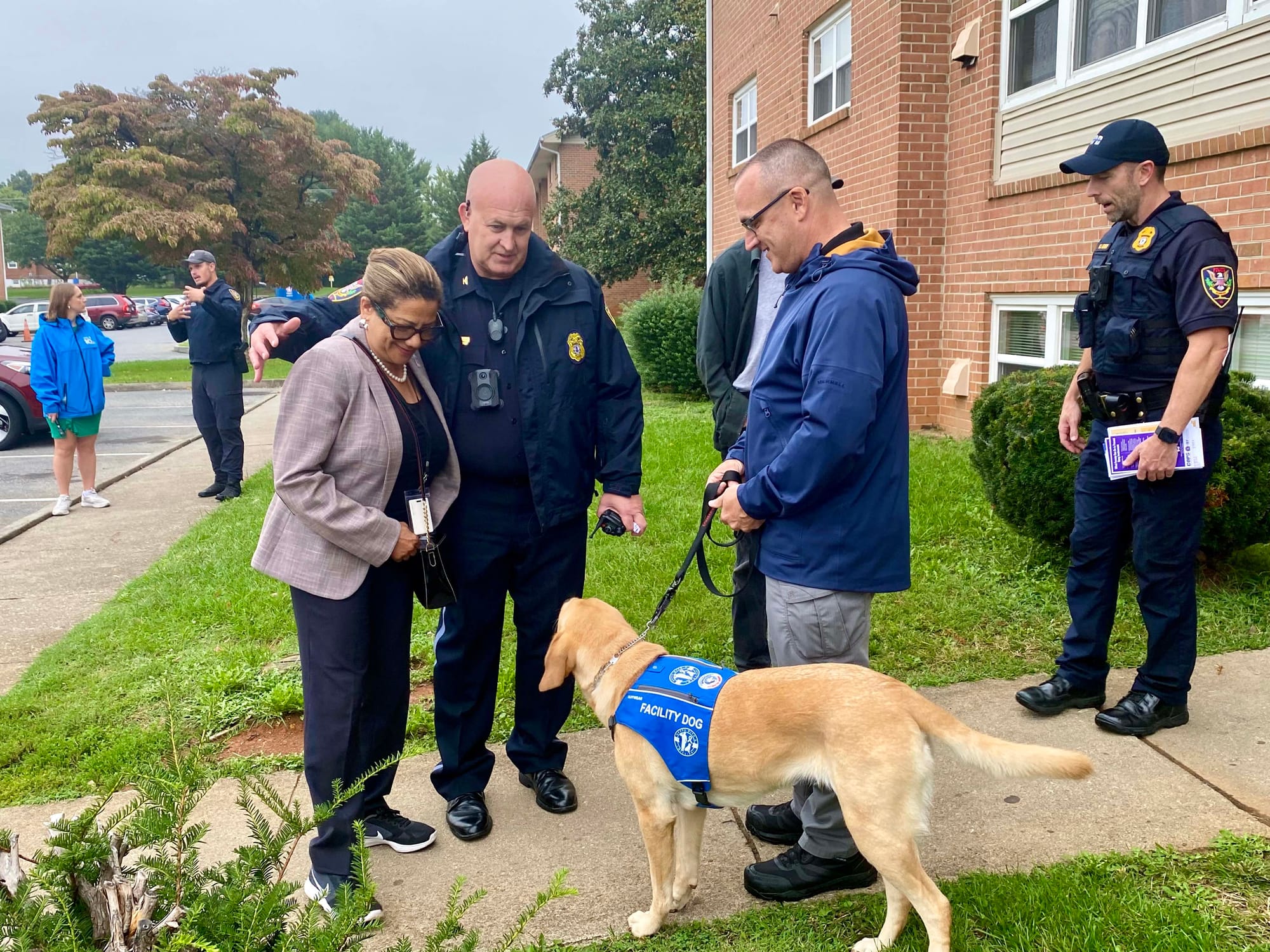Roanoke Gun Violence Rates Fall to Pre-Pandemic Levels, One Year into Police Chief's Tenure
“I found a department that was hungry for leadership,” Police Chief Scott Booth said about arriving in Roanoke a year ago.

Roanoke Police Chief Scott Booth stood in city hall about a year ago this month with a promise.
“We will reduce crime here in this community, make no mistake,” Booth told reporters after his swearing-in ceremony. “My pledge to you is that when we stand here next year, we'll be standing in a safer community.”
Data on violent crime is bearing that pledge out.
After Roanoke experienced a record 31 homicides in 2023 — 24 of which were fatal shootings — the city so far this year has seen 10 homicides, nine involving guns. The rate of non-fatal shootings this year has fallen roughly in half, to levels not seen since before the pandemic.
“Good policing absolutely is a big part of that,” Booth told reporters last month. “A community coming together is another part of that.”
Programs from the city’s Gun Violence Prevention Commission are bearing fruit, according to Booth, who has brought regular police community walks and public forums to Roanoke. New policing methods are making a dent in the city’s violent crime rate, he says, though the city’s top prosecutor maintains that good fortune plays a big role in the drop.
“Roanoke got very lucky with that hire,” Commonwealth’s Attorney Don Caldwell said. “I’ve been very, very impressed with Scott. He is an experienced police officer, a good leader. He is a communicator, and I think has a lot of common sense and good judgment.”
While Caldwell did not completely discount the work of the police department and Gun Violence Prevention Commission in turning the tide on violence, he thinks fate plays a bigger role.
Caldwell recalled an answer he gave NPR back in 1993 when the media outlet asked him why Roanoke had three homicides that year.
“I gave them an honest answer. I said, ‘dumb luck,’” Caldwell said. “We’ve been lucky this year, so I hope the luck continues.”
'A whole lot more to worry about'
Booth, the former chief in Danville, took over the police department from Sam Roman, who became an assistant city manager last summer.
Before Booth’s arrival, an outside report commissioned by the city found the department was plagued by morale issues, “very poor” internal communication and “open dissension” among police brass. The report said Roanoke needed to improve relations among police leaders since “some employees may be leaving the agency to escape a toxic work environment.”
Booth described himself as “kind of a one-trick pony” in that his focus in Danville, and before that in Richmond, was about how to build a policing model that reduces crime.
“But coming into Roanoke a year ago, we had a whole lot more to worry about than just reducing crime,” Booth said. “We had a department that was really kind of struggling with some communication issues, trust issues. You know, we had a deputy chief and a captain that had left the department kind of under a cloud of scrutiny, and we were able to kind of work together and build a team that, I believe, certainly trusts each other more.”
Two months before Booth’s arrival, a deputy chief resigned amid scrutiny of his military record; asked about the captain incident, as well as the recent departure of deputy chief Jerry Stokes, a police spokeswoman said the agency “does not provide specifics on personnel matters.” The department recently hired Mike Crawley, the former chief in Salem, as a deputy chief.
“I found a department that was hungry for leadership,” Booth said.
A 2021 survey by the Roanoke City Police Association, an officers’ union, gave Roman a poor grade. Lieutenant Joel Camp, president of the association, declined a request for this story to discuss Booth’s leadership.

Roanoke’s chief says the department is focused on reducing violent crime.
A team of detectives and officers now responds to non-fatal shootings, where previously sometimes a detective did not bother to go out, according to Booth. Police lieutenants are now assigned to zones so mid-level management can be more responsive to citizens’ needs. Residents’ concerns aren’t falling through the cracks as much as they did before, the chief said.
“We’re much more focused on where crime is happening in our community,” Booth said. “It’s very person-based, very place-based.”
A three-year analysis of crime data found four areas that are disproportionately affected by violent crime, according to the department: downtown, Belmont, Lincoln Terrace and Lansdowne.
Booth told city leaders recently that in Danville “a lot of folks would make fun of me” for his high-profile community walks, but he insists they pay off.
“Anytime we’re engaging our community, they trust us more,” he said in September. “If you don't build trust in the community, people are not going to call you when something bad happens.”
'The numbers are true'
Rita Joyce is president of FEDUP with Gun Violence, a nonprofit that helps families who are grieving the loss of loved ones to shootings. Joyce’s son was killed in a 2004 shooting.
“He came in with boots down,” Joyce said of Booth. “He was on a mission and I just felt like he accomplished that in his first year.”
She says improvements are still needed, particularly after a police case goes to the prosecutor’s office. “One family member’s just devastated that, her son was just gunned down, and they closed the case, not enough evidence. Do you know how that family feels?”
While Joyce said some residents probably feel safer because of lower homicide numbers this year, shootings can still seem routine in parts of the city.
“Gun violence in Northwest Roanoke, particularly, has almost become a norm and that’s unfortunate, and it saddens me to know that,” she said.
Rabbi Kathy Cohen, who chairs the Gun Violence Prevention Commission, says Booth has been responsive to the community, which makes it more likely for police to solve crimes.
“Building trust gives people the feeling that they can give the police information, and with having this information about what’s really going on, the police are in a better position to do their job,” she said.
“In certain areas, people unfortunately continue to hear gunshots,” Cohen added. “We still have, I think, some work to do to get the community to really believe these numbers and to feel safer. But the numbers are true.”
For 2025, Booth says the department will finish training all officers on de-escalation tactics. He also intends to expand the agency’s use of TASER stun guns, “which right now is somewhat limited for a department our size.” Booth said he wants to expand the city’s take-home car program for officers to make the agency more competitive. Filling police vacancies — which last month stood at 42 sworn officers in a department of 220 officers — remains a priority.

